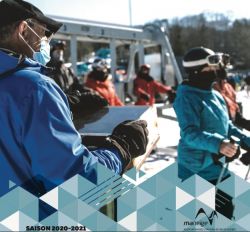Quebec Ski Areas: Complete review of the 2020-21 ski seasonA popular season for skiers but a decline in financial results for resort owners Terrebonne,– The COVID-19 pandemic has forced ski area operators to constantly adapt to the changing sanitary measures last season, which, against all odds, continues for the current season. The 2020-2021 financial results unveiled as part of the Economic and Financial Study of Quebec Ski Areas Association are unequivocal: the effects of the pandemic have greatly impacted the total business volume of the ski industry (-22.5%), even though ski areas had the opportunity to remain open during this exceptional season. Ticket and season pass sales were also impacted by the COVID-19, a result directly related to the 50% capacity management across the province. Skiing, however, continued to be one of the most popular activities, as evidenced by the study's ridership data. "We did see an increase in ski days, but all other financial indicators are down. This is the first study of a tourism sector to report on the effects of the pandemic on winter tourism in Quebec," said Michel Archambault, Director of the study and Professor Emeritus in tourism at ESG UQAM. In addition to the decrease in ticket and subscription sales, the main highlights are as follows:
The figures speak for themselves: revenues other than ticket sales, i.e., equipment rentals, restaurants and ski school, are down significantly (-52%). The complete and partial closure of the ski schools (-$14M) during the season, as well as the partial closures of the restaurant and chalets, inevitably led to a drop in revenues from the operation of these services. "These dropsin revenue, in addition to the $5 million spent on implementing various measures to adapt to the health context, such as signage, manpower, personal protective equipment, setting up online sales systems, etc., ultimately affected the results of the last season," said Yves Juneau, President and CEO of the Quebec Ski Areas Association. These types of closures or restrictions have certainly caused a lot of headaches for operators, particularly because of the loss of revenue. However, the introduction of government subsidies and financial assistance, such as the Canada Emergency Wage Subsidy (CEWS), has allowed ski areas to stay afloat. The 2020-2021 season therefore ended with better-than-expected results, considering that without these government programs, many resorts would have had to report a significant deficit. The decrease in revenues also slowed the deployment of new infrastructure projects. Prior to the pandemic, the industry was on an investment roll as evidenced by the 2018-2019 and 2019-2020 season reports with $78 million and $55.7 million in investments respectively. The dollars invested in improvements last season dropped to $22 million. The pandemic will therefore have taken its toll on the financial health of ski resorts. Fortunately, they can count on a clientele that has not lost a single bit of passion, as showed by the number of ski days for the 2020-2021 season: 6.1 million visits, up 4.5%, confirming the popularity of outdoor activities in Quebec and more specifically the interest in downhill skiing and snowboarding. Beyond the numbers, President of the Board of Directors of the ASSQ and President of Mont Sutton, Mr. Jean-Michel Ryan, says he is proud to have succeeded in getting through the last season in a difficult operating context, but especially happy to have allowed the Quebec population to take on the ski slopes throughout the winter and to have provided a dose of happiness to the fans of snow sports. "We are grateful to Ministers Caroline Proulx and Isabelle Charest, who ensured that the ski areas were able to operate in a safe environment for customers and staff, with precise and well-respected sanitary measures," said Ryan. About the Quebec Ski Areas Association and the industry Founded in 1979, the ASSQ is a non-profit organization grouping together Quebec’s ski areas. Its mission is to promote and defend the interests of the ski areas, to foster the development of the next generation, and to support the industry to offer skiers and snowboarders memorable experiences. Skiing and snowboarding is practiced by about 1,4 million Quebecers.
|
ropeways.net | Home | Economy | 2022-01-21
More articles:
Mountain Travel Symposium Summit Award
2024-04-22
Snowsports Merchandising Corporation and Sports Specialists Ltd. Announce Official Merger
2024-04-19
Google Adsense




 Back
Back Add Photos
Add Photos Print
Print